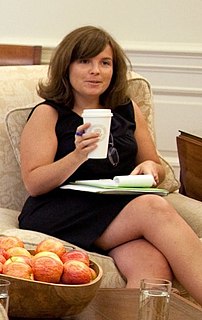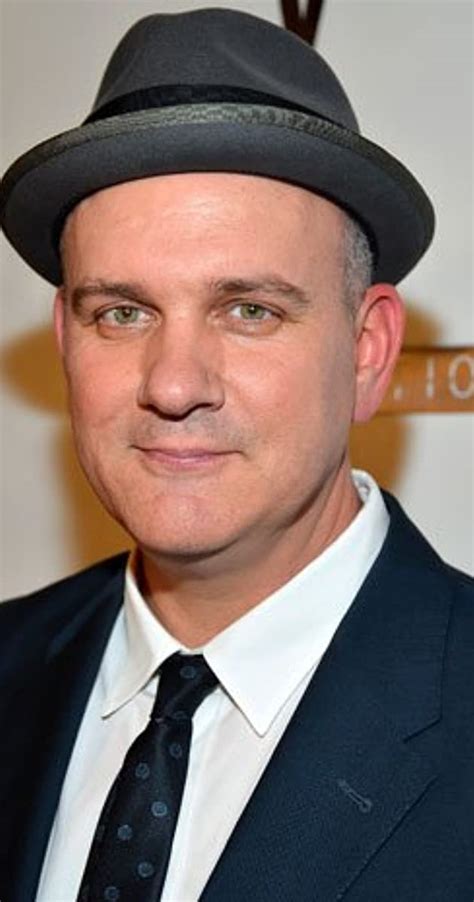A Quote by Alyssa Mastromonaco
I think that if you look at all of the books that have ever been written about people working in the White House, they're sort of the opposite of my book. And I think that so many people want to write a book that sort of memorializes their place in history. And I wanted to write something for all of the women who are like me. I grew up in upstate New York, I graduated high school with 70 other people and didn't ever know that anything like this would have really been an option for me. So I wanted other young women — and men — to know that just being you is plenty.
Quote Topics
About
Anything
Been
Being
Book
Books
Ever
Graduated
Grew
Grew Up
High
High School
History
House
Just
Just Be
Just Being
Just Being You
Know
Like
Like Me
Look
Many
Me
Men
New
New York
Opposite
Option
Other
People
Place
Plenty
Really
School
So Many People
Something
Sort
Think
Up
Upstate New York
Want
Wanted
White
White House
Women
Working
Would
Write
Written
York
Young
Young Women
Related Quotes
I wanted young women to know that I was very lucky that I worked for people who literally let me be me. If I had ever been anyone other than me, I would have come off as a fake, a phony, a fraud, and never would have gotten where I ultimately ended up. You can be yourself and be in politics, and they should know that. That was kind of why I wanted to do it - because I didn't see any freaks in politics like me.
I think, for me, there's The Book I Should Write and The Book I Wanted to Write - and they weren't the same book. The Book I Should Write should be realistic, since I studied English Lit. It should be cultural. It should reflect where I am today. The Book I Wanted to Write would probably include flying women, magic, and all of that.
Blogging has mostly been an opportunity to react more immediately to experiences to try out ideas that I may end up using in the print media or in some other place. When I write books, it's a way for me to bring readers into the experience of writing the book, all through the process of writing the books that I write. I talk about what I'm up to in the blog. I let people know what I am doing. To me, it's just part of putting my professional life up in a way that people who are interested in it can access; and learning things from them as well.
I told myself that if I hoped to write a book that helped people to take a good look at some of the names that have been written on their nametags, I would need to do the same. I had to write Hello, My Name Is from a place of authenticity, even vulnerability, being willing to let God show me areas of my life that have been incorrectly shaped by false identities I've allowed to hang around for too long. I truly felt like, 'if this book is helping me, then it's going to help someone else.'
Now, I think a lot of people look around and feel that we're relatively equal with men. In fact, women are now the majority of college graduates, we have role models like Hillary Clinton to look up to - it seems like the world is completely open to us and we can accomplish anything. I think feminists are often disdained today because we're seen as complaining about a problem people think no longer exists. I also think young women shy away from calling themselves feminists because many haven't been educated about it or exposed to it. They don't know enough about it to identify with it.
I've always enjoyed stories that take place in the future but my one disappointment was that the future books described never came. We're not on other planets, there are no flying cars, and the only robots we have in our homes just sweep the floor. So I wanted to write about a future that I thought could really happen. People ask me when I tell them the title of the book, 'Are we all dead?' The good news is, no. We're still here. And I even think the future in my book is strangely hopeful, although I'm sure there will be people who strongly disagree.
As an author, I don't really think too much about being a celebrity. It's not like being a movie star or a TV star. It's not as if people recognize me when I walk down the street. That hardly ever happens, and it's just as well. But it is great when people know my books, when I walk through an airport and see them in the bookstore, or when I see someone reading a book on a plane or on a train, and it's something I've written. That's a wonderful feeling.
There have been plenty of things that I've written that other people haven't cared about, but it hasn't stopped me from being a writer. So, I don't even think about other people. I'm just interested writing about human beings so if somebody calls and says, 'We'd like you to do it,' I'd say, 'That sounds like a cool idea.'
I don't write because I think I have anything particularly interesting to say. I write because I love writing more than any other work I've done. I do think about entertaining the reader to the extent that I try always to write a book that I myself would want to read, but I don't think it's up for me to decide if what I've written is interesting to others. That is entirely up to others.
The young adult literature is relatively new - it just kind of exploded in the 2000s. When I grew up, there weren't bookstores with sections dedicated to teen lit, nor was my generation raised reading books written specifically for us. Because of that, today we still think of books for teens as children's books and so when you write a book that includes sensitive topics, it just seems even more controversial. What's troubling to me about that is these are issues adults know that teens deal with. Not writing about them makes them something we don't, or can't talk about.
I have three boys. And I wanted to make sure it connected with them and then those guys who grew up like me, in environments like me.And then I knew something about science that your New York Times reader would be interested in. So I was thinking about it in multiple ways: I'll connect with the people who grew up like me first, and then the New York Times reader will be interested in the science because it's so good and they want to be "in the know."
I think as women, you know, if you are considered a pioneer in these things, you can get really distracted by these other things - you know, people's demands of you reflecting on your otherness. And for this white critic to say, "I don't understand why she doesn't do that" - and you're like, "It's because I'm running a show on a major network and I want the show to continue" - and to sort of guilt me.































